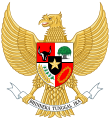
Back الانتخابات العامة الإندونيسية 2019 Arabic Ινδονησιακές γενικές εκλογές (2019) Greek انتخابات سراسری سال ۲۰۱۹ اندونزی Persian Pemilihan umum Indonesia 2019 ID 2019年インドネシア総選挙 Japanese Pamiliahan umum Indonesia 2019 MIN Pilihan raya umum Indonesia 2019 Malay Eleições gerais na Indonésia em 2019 Portuguese การเลือกตั้งในประเทศอินโดนีเซีย ค.ศ. 2019 Thai Tổng tuyển cử Indonesia 2019 Vietnamese
| ||||||||||||||||||||||||||||||||||||||||||||||||||||||||||||||||||
|
| ||||||||||||||||||||||||||||||||||||||||||||||||||||||||||||||||||
Presidential election | ||||||||||||||||||||||||||||||||||||||||||||||||||||||||||||||||||
| Registered | 192,770,611 ( | |||||||||||||||||||||||||||||||||||||||||||||||||||||||||||||||||
|---|---|---|---|---|---|---|---|---|---|---|---|---|---|---|---|---|---|---|---|---|---|---|---|---|---|---|---|---|---|---|---|---|---|---|---|---|---|---|---|---|---|---|---|---|---|---|---|---|---|---|---|---|---|---|---|---|---|---|---|---|---|---|---|---|---|---|
| Turnout | 81.97% ( | |||||||||||||||||||||||||||||||||||||||||||||||||||||||||||||||||
| ||||||||||||||||||||||||||||||||||||||||||||||||||||||||||||||||||
| ||||||||||||||||||||||||||||||||||||||||||||||||||||||||||||||||||
All 575 seats in the House of Representatives 288 seats needed for a majority | ||||||||||||||||||||||||||||||||||||||||||||||||||||||||||||||||||
| Turnout | 81.69% ( | |||||||||||||||||||||||||||||||||||||||||||||||||||||||||||||||||
This lists parties that won seats. See the complete results below.
| ||||||||||||||||||||||||||||||||||||||||||||||||||||||||||||||||||
| This article is part of a series on the |
| Politics of Indonesia |
|---|
 |
General elections were held in Indonesia on 17 April 2019.[1][2] For the first time in the country's history, the president, the vice president, members of the People's Consultative Assembly (MPR), and members of local legislative bodies were elected on the same day with over 190 million eligible voters. Sixteen parties participated in the elections nationally, including four new parties.
The presidential election, the fourth in the country's history, used a direct, simple majority system, with incumbent president Joko Widodo, known as Jokowi, running for re-election with senior Muslim cleric Ma'ruf Amin as his running mate against former general Prabowo Subianto and former Jakarta vice governor Sandiaga Uno for a five-year term between 2019 and 2024. The election was a rematch of the 2014 presidential election, in which Jokowi defeated Prabowo. The legislative election, which was the 12th such election for Indonesia, saw over 240,000 candidates competing for over 20,000 seats in the MPR and local councils for provinces and cities or regencies, with over 8,000 competing for the People's Representative Council (DPR) seats alone. The election was described as "one of the most complicated single-day ballots in global history."[3] Jokowi's 85.6 million votes were the most votes cast for a single candidate in any democratic election in Indonesia's history, exceeding the record of his predecessor Susilo Bambang Yudhoyono, who won 73.8 million votes in 2009.[4] His successor Prabowo Subianto surpassed his record in the 2024 election winning with more than 96 million votes.
On 21 May 2019, the General Elections Commission (KPU) declared Jokowi victorious in the presidential election, with over 55% of the vote. Widodo's PDI-P finished first in the DPR election with 19.33%, followed by Prabowo's Gerindra with 12.57%, then Golkar with 12.31%, the National Awakening Party (PKB) with 9.69%, the NasDem Party with 9.05%, and the Prosperous Justice Party (PKS) with 8.21%.
Following the election, reports of the more than 7 million election workers, among which 569 had died during the lengthy voting and counting process, surfaced. Prabowo's campaign team claimed that the deaths were linked to fraud that disadvantaged him.[5] As of 9 May 2019, the election commission (KPU) said the dead included 456 election officers, 91 supervisory agents and 22 police officers.[6]
In the early morning of 22 May 2019, supporters of Prabowo protested in Jakarta against Jokowi's victory. The protest turned into a riot, which left eight people killed by security officers and over 600 injured.[7]
Cite error: There are <ref group=lower-alpha> tags or {{efn}} templates on this page, but the references will not show without a {{reflist|group=lower-alpha}} template or {{notelist}} template (see the help page).
- ^ Zunita Putri (21 May 2019). "KPU Tetapkan Jokowi-Ma'ruf Pemenang Pilpres 2019". Detik.com (in Indonesian). Archived from the original on 22 May 2019. Retrieved 21 May 2019.
- ^ Zunita Putri (21 May 2019). "KPU Tetapkan Hasil Pileg 2019: PDIP Juara, Disusul Gerindra-Golkar". Detik.com (in Indonesian). Archived from the original on 31 May 2019. Retrieved 21 May 2019.
- ^ Bland, Ben (3 April 2019). "The mind-boggling challenge of Indonesia's election logistics". The Interpreter. Archived from the original on 11 April 2019. Retrieved 11 April 2019.
- ^ Rizky Suryarandika (31 May 2019). "Suara Jokowi-Amin di Pilpres 2019 Lampaui SBY dan Obama". Republika.co.id (in Indonesian). Archived from the original on 24 July 2020. Retrieved 9 May 2020.
- ^ "Old age, poor health caused deaths of poll administrators: Indonesia government". The Straits Times. 12 May 2019. Archived from the original on 14 May 2019. Retrieved 14 May 2019.
- ^ Beo Da Costa, Agustinus (9 May 2019). "Indonesia should probe deaths of election staff – parliament deputy". Reuters. Archived from the original on 11 May 2019. Retrieved 11 May 2019.
- ^ Medistiara, Yulida (23 May 2019). "Anies: 8 Orang Meninggal Dunia dalam Aksi 21-22 Mei". detiknews (in Indonesian). Archived from the original on 23 May 2019. Retrieved 24 May 2019.





